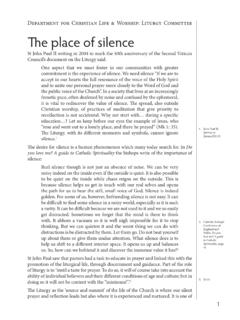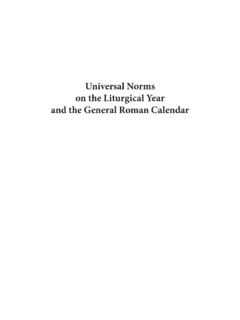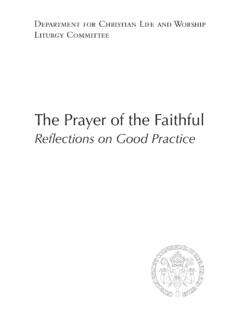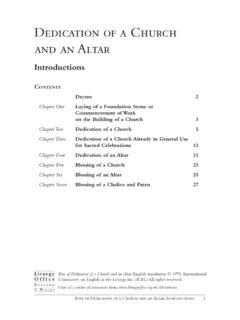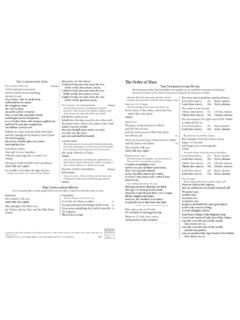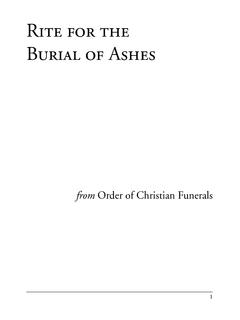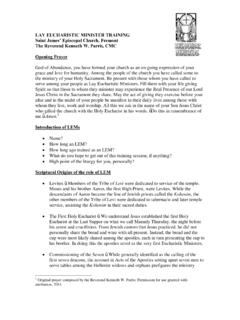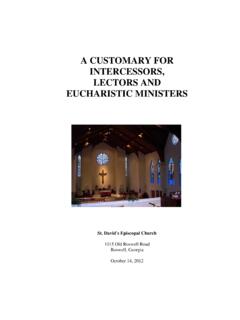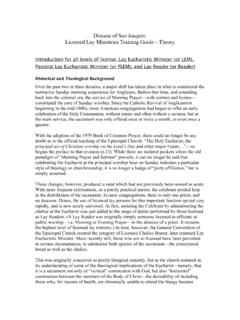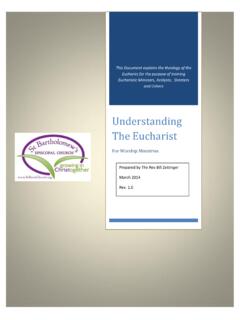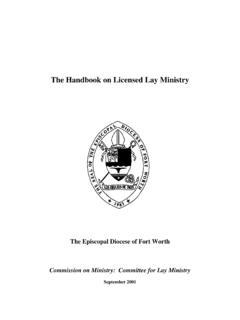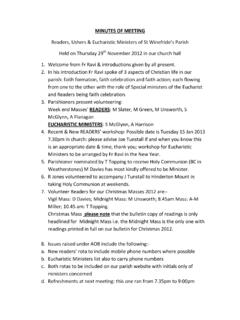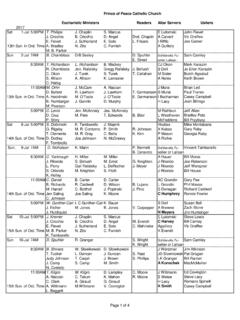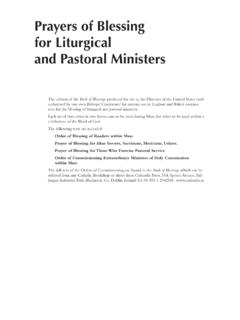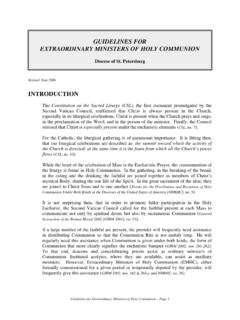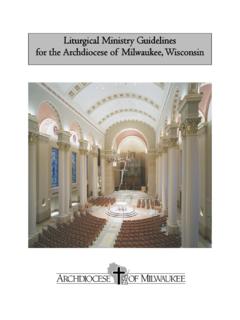Transcription of Ministers of the Word - Liturgy Office
1 Ministers of the WordGuidelines prepared by the Liturgy Office of the Bishops Conference of England and Unity of Word and Sacrament 2 The Liturgy of the Word 3 Diversity of Ministry within the Liturgy of the Word 3 Bishop 4 Priest 4 Deacon 5 reader 5 Ministers of Music 5 Liturgy of the Word with Children 6 Lay Readers Coordinator 6 Selection 7 Formation 7 Continuing Support and Formation for Ministers 8 Commissioning 9 Vesture 9 Renewal of Commission 9 Practicalities 10 Before Mass 10On arrival at church 10 During Mass 11 Diocesan Norms 11 Endnotes 12A Resource for The Gift of Scripture2 The Church has always venerated the divine Scriptures as she venerated the Body of the Lord, in so far as she never ceases, particularly in the sacred Liturgy , to partake of the bread of life and to offer it to the faithful from the one table of the Word of God and the Body of Christ.
2 1 Christ is always present in His Church, especially in her liturgical He is present in His word, since it is He Himself who speaks when the holy scriptures are read in the Church has always regarded the Scriptures, together with Tradition, as the supreme rule of her faith. Inspired by God both Sacred Scripture and Sacred Tradition present God s very word, and is a single sacred deposit of the word of God which is entrusted to the Church. By adhering to it the entire holy people, united to its pastors, remains always faithful to the teaching of the apostles, to the community of faith, to the breaking of bread and the ministry of the word of God is exercised in a variety of forms, for example in the Liturgy and in catechesis. It is exercised by a variety of Ministers . Within a Diocese this ministry is primarily the responsibility of the Bishop, and is exercised in collaboration with his priests, deacons, catechists.
3 This document confines itself to considering the ministry of the word in the Liturgy . In particular it is concerned with lay Ministers of the word but it is valuable to place these ministries within the context of all liturgical Ministers who serve in the Liturgy of the Word. The focus is the Liturgy of the Word at Mass but many of the principles and practical guidance will apply to other liturgical care should always be exercised in the preparation and celebration of the Liturgy of the Word such is the nature and value of the word proclaimed in the Liturgy . It is particularly important that those called to be liturgical Ministers of the word should have the skills necessary for what is entrusted to them, so that through what they do they may serve the life and mission of the Church is built up and grows when she gathers to listen to God s word.
4 In the liturgical celebration God s many wonderful, past works in the history of salvation are symbolically presented anew. God in turn makes use of the assembly of the faithful who celebrate the Liturgy in order that his word may speed on in triumph and his name be exalted among all Unity of Word and SacramentIt is from the scriptures that the prayers and songs of the Liturgy draw their inspiration and their force, and that the actions and signs of the Liturgy derive their meaning. The revision of the Liturgy required by the 2nd Vatican Council has ensured that the intimate connection between the liturgical rites and the scriptures has been made more apparent. In all the rites of the Church there is now a more ample, varied and suitable provision of scripture. This is most obvious in the case of the celebrations of the sacraments, where each celebration includes a Liturgy of the Word, the two realities so closely connected as to form one act of the Liturgy of the Word God himself speaks with his people, opening up to them the mystery of redemption and salvation, and nourishing their spirit.
5 Christ himself is present in the midst of the faithful through his at Mass6, in the word of God the divine covenant is announced; and in the Eucharist the new and everlasting covenant is embodied and By hearing the word proclaimed in worship, the faithful again enter into the unending dialogue between God and his chosen people, a dialogue sealed in the sharing of the eucharistic food. The meaning of communion is proclaimed in the word; the message of Scripture is made actual once again in the communion banquet. The proclamation of the word is thus integral to the Mass and at its very Liturgy of the WordThe readings from Sacred Scripture and the chants between the readings (Psalm and Gospel acclamation) form the main part of the Liturgy of the Word. The homily, Profession of Faith, and Prayer of the Faithful (general intercessions) expand and complete this part of the Mass.
6 In the readings God speaks with his people, opening up to them the mystery of redemption and salvation, and nourishing their spirit; Christ himself is present in the midst of the faithful through his word. By their silent listening and pondering, and by their singing and acclamation, the people make God s word their own, and begin to respond to it in their hearts. The homily is an integral part of the Liturgy to assist the assembly to hear the voice of the Lord in his word. Finally, having been nourished by this word, the assembly affirms its acceptance of it by the profession of faith and makes petition in the Prayer of the Faithful (general intercessions), praying for the needs of the entire Church and for the salvation of the whole Lectionary for Mass, revised at the direction of the Second Vatican Council, has opened up the treasures of the Bible, so that richer fare might be provided for the faithful at the table of God s word.
7 The Introduction to the Lectionary for Mass speaks extensively of the place of the word of God in the plan of salvation and in the life of the Church. All who share in the ministry of the word will want to study this Introduction and take its teaching to richness in the quantity and in the variety of readings in the Lectionary challenges those who are called upon to proclaim the Scriptures at Mass. Each of the individual sacred authors reflected on the meaning of God s action in history from their own perspective. They employed various literary forms to convey the message of salvation, ranging, for example, from narratives and the poetry of the psalms to prophetic oracles and parables, from theological expositions to apocalyptic visions. A reader will proclaim the word of the Lord more fully and effectively if he or she has an awareness of the literary form of a particular reading or Diversity of Ministry within the Liturgy of the WordThe eucharistic celebration is an action of Christ and the Church, namely, the holy people united to and ordered under the Bishop.
8 For this reason, the eucharistic celebration pertains to the whole Body of the Church, manifests it, and has effects on it. It also touches the individual members of the Church in different ways, according to their different orders, duties, and actual participation in the Eucharist. In this way, the Christian people, a chosen race, a royal priesthood, a holy nation, a people set apart, expresses its cohesion and its hierarchical ordering. Therefore, all, whether ordained Ministers or lay Christian faithful, by virtue of their Office or their duty, should do all but only those parts that belong to the Liturgy the members of the Church, the Body of Christ, are united with each other and with Christ their head. They are united in and by the principal actions of gathering, listening to God s word, praying for life of the Church and the world, giving thanks, sharing communion and being sent out for the work of loving and serving there should be a diversity of ministry to effect a worthy celebration of God s word.
9 The diversity of ministries exercised exhibits the hierarchical and communitarian dimensions of the liturgical assembly. It is a bishop or priest who presides over the whole of the Liturgy of the Word and who preaches the homily. By contrast, traditionally, the role of proclaiming the readings is ministerial not presidential. Therefore a reader should proclaim the readings, and a deacon, or, in 4his absence, a priest other than the celebrant should announce the Still other Ministers are involved in enabling the singing of the psalm and gospel acclamation. God speaks to the assembly through the Ministers of the Liturgy of the Word, clergy and lay readers. They mediate to the assembly the presence of Their ministry is exercised in the service of the assembly, helping them to hear the living word of God, and enabling them to begin the work which belongs to the assembly of pondering that word in their hearts and beginning to respond to it in assist the wider assembly by means both of their work of proclamation, and by their modelling for the assembly the work which is common to all of listening to the word proclaimed.
10 BishopThe diocesan Bishop, the chief steward of the mysteries of God in the particular Church entrusted to his care, is the moderator, promoter, and guardian of its entire liturgical life. In celebrations at which the Bishop presides, the mystery of the Church is revealed, especially at a eucharistic celebration led by the Bishop at which the presbyterate, deacons, and people participate. For this reason, the solemn celebration of Masses of this type ought to be an example for the entire the role of proclaiming the readings is ministerial and not presidential the Bishop s principal Office at the Liturgy of the Word is that of preaching. The other roles are normally to be performed by other Ministers , ordained and the Office of preaching is proper to the Bishop he should preach the homily himself whenever he presides at a celebration of the The presidential role of the Bishop is also indicated by the blessing he gives to the deacon who will proclaim the Gospel (or, in the absence of a deacon, to the priest).
